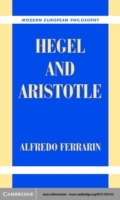Hegel is, arguably, the most difficult of all philosophers. To find a way into his thought interpreters have usually approached him as though he were developing Kantian and Fichtean themes. This book demonstrates in a systematic way that it makes much more sense to view Hegel's idealism in relation to the metaphysical and epistemological tradition stemming from Aristotle. The book offers an account of Hegel's idealism in light of his interpretation, discussion, assimilation and critique of Aristotle's philosophy. There are explorations of Hegelian and Aristotelian views of system and history; being, metaphysics, logic, and truth; nature and subjectivity; spirit, knowledge, and self-knowledge; ethics and politics. No serious student of Hegel can afford to ignore this major interpretation. It will also be of interest in such fields as political science and the history of ideas.

